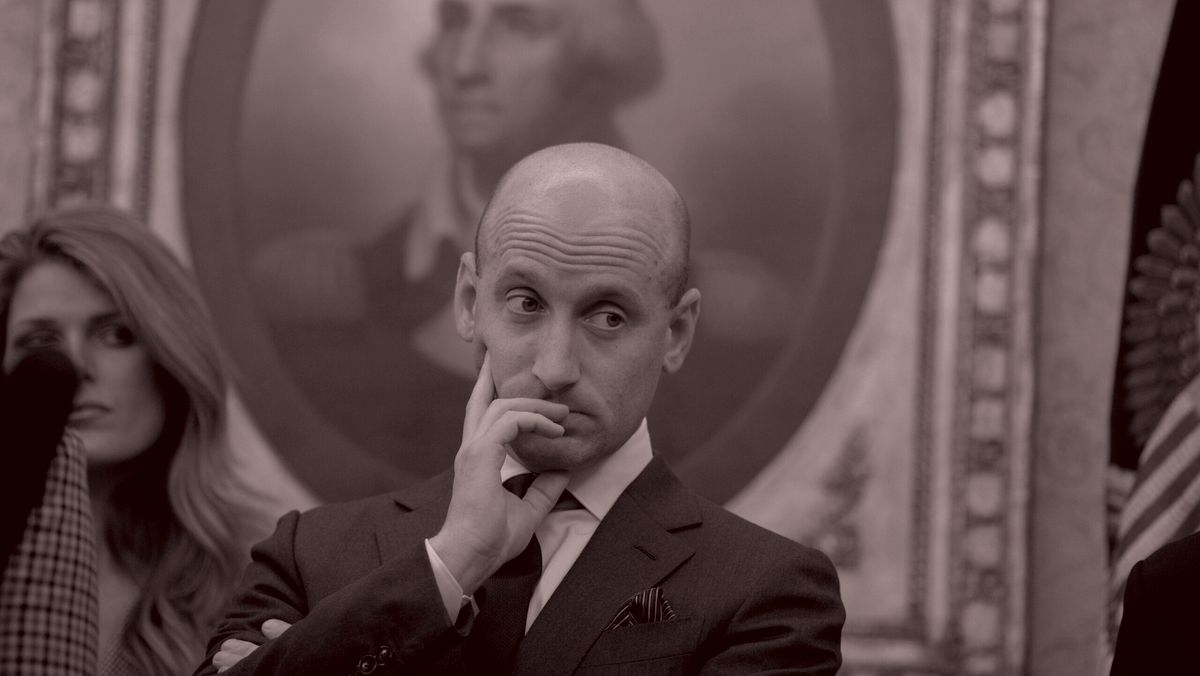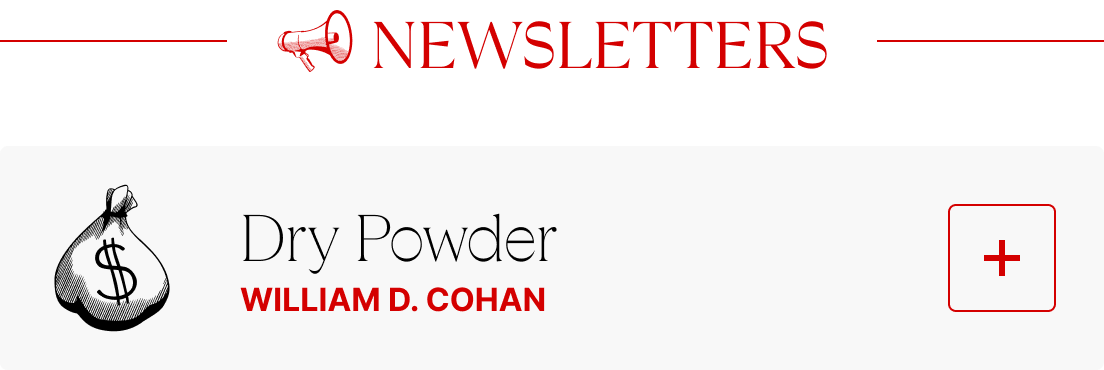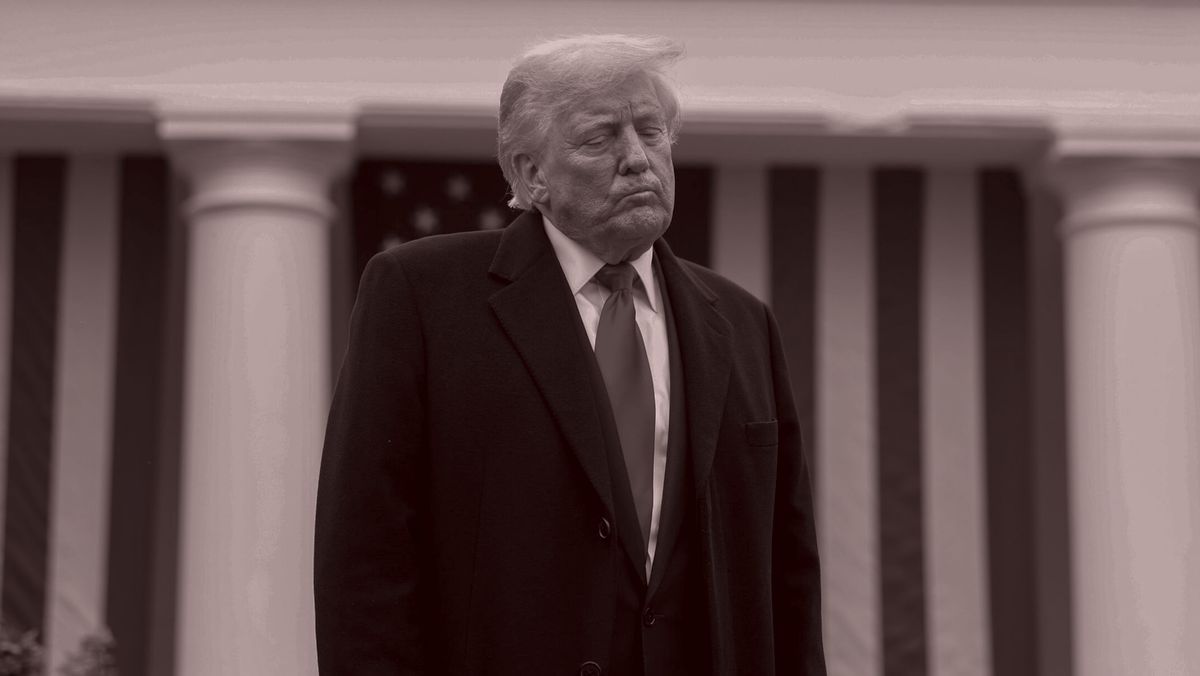Hello and welcome back to The Best & The Brightest. I’m Leigh
Ann Caldwell with you on this second Wednesday in April, a.k.a. What the Hell Just Happened Day.
This is one of those days where I had to throw out my draft and start over after Trump blew up the news cycle—a nearly daily occurrence during his first term. But I am here to help you make sense of what happened, and walk you through the week that led to this head-spinning moment,
including the intense pressure campaign the White House waged on Capitol Hill Republicans. G.O.P. lawmakers were ordered not to break with Trump on tariffs… only for Trump to break first. I get into it below…
But first…
|
- Cornyn vs. Paxton: Everything’s bigger in Texas, they say. And the Republican Senate primary is no exception, especially now that Texas Attorney General Ken Paxton has formally announced that he is challenging four-term Senator John Cornyn for his seat in what Republican operatives say will be an extremely expensive, deeply personal, and particularly nasty intraparty throwdown. Just check out the opening statement from a Cornyn
campaign spokesperson, calling Paxton a “fraud” and someone who “uses fake Uber accounts to meet his girlfriend and deceive his family.”
Paxton, who was impeached by the Texas House for corruption and bribery, then acquitted by the Texas Senate, is a darling of the state’s conservative right, but won’t have the institutional support of the National Republican Senatorial Committee, which is backing Cornyn. “John Cornyn is a leader who delivers on President Trump’s agenda and for the people
of Texas in the U.S. Senate,” N.R.S.C. chairman Senator Tim Scott said in a statement. The Senate G.O.P.–aligned super PAC, the Senate Leadership Fund, “fully intends on seeing [Cornyn] reelected next November,” S.L.F. chair Cory Gardner said in a statement.
The big question, however, is whether Trump will endorse a candidate in the race. The president came to Paxton’s defense during his impeachment, but Cornyn has worked to shore up his relationship with
him. Trump’s potential distance could be damaging for Cornyn, a mild-mannered traditional conservative and top-notch fundraiser. Regardless, a primary could suck up a ton of money and resources that most Republicans would rather use to defeat Democrats in November.
|
|
|
Inside the White House’s white-knuckle pressure campaign to force Hill Republicans
not to break with Trump’s tariff policy, no matter the cost… only for Trump himself to blink.
|
|
|
Senate Republicans were enjoying a closed-door luncheon, as they
usually do on Wednesdays, when Donald Trump wrote on social media that he was pausing most of the “reciprocal” tariffs he announced last week in the Rose Garden. Over the past few days, equity markets had been pulverized, losing trillions of dollars; Wall Street had been in an uproar, frantically trying to get a hearing in Washington; and lawmakers had been getting an earful from nervous voters back home. At 12:01 a.m. on Wednesday, the administration imposed even higher
retaliatory tariffs on 50 countries.
Then, a little after 1 p.m., the president backed down. While cranking up tariffs on China to 125 percent, he authorized a 90-day pause for other countries, bringing most tariffs down to 10 percent. Kansas Senator Roger Marshall saw the news first, and announced it to his colleagues. The reaction? Pure relief, one senator in the room told
me.
Thus ends, at least for now, one of the most dramatic and economically damaging weeks of the past few decades (and it’s only Wednesday)—complete with massive market sell-offs, predictions of a recession, widespread economic uncertainty, and a possibly irreparable loss of confidence in the U.S. as a trading partner. Oh, and it also cost most Republicans a great deal of political capital, too. So it goes
with Trump’s YOLO presidency.
No longer restrained by cautious aides or dissenters within his administration as he was in his first term, and unlikely to face voters again, Trump is using his lame duck presidency to do whatever the hell he wants and use whatever means to justify it. In this case, that meant claiming a national security emergency to impose significant across-the-board tariffs on some
100 countries, plus retaliatory tariffs on another 50 or so nations that run trade surpluses with the United States. Without Gary Cohn or Steve Mnuchin to talk him out of it, Trump was free to finally act on his long-standing, unshakable belief that tariffs are inherently good, and that trade deficits are bad.
That is, until he reversed course. In the end, the market
reaction—a multitrillion-dollar global rout that stoked panic in the bond market and a mini-revolt among Capitol Hill Republicans—had become too much to bear. But Trump and his advisors are claiming victory, attributing the sudden reversal to 75 countries’ having leaped to negotiate, though few concrete changes in trade policies have actually been announced. In
other words, per the predictable spin, the switcheroo is just what happens when the self-labeled greatest negotiator on earth gets to work.
But whatever the strength of Trump’s negotiating skills, they have nothing on his ability to turn a calamity into a victory… and extend his command over Republicans. Speaker Mike Johnson joined Trump aides and allies posting pictures of The Art of the Deal on social media, as if this had all been
part of the perverse plan. His supporters will surely give him loads of credit for avoiding the potential economic catastrophe he himself nearly brought about, and may yet still.
|
However many Republicans are now pleased to insist that Trump knew what
he was doing all along the past week was a roller coaster on Capitol Hill, with Trump’s tariff policy testing the limits of his party’s loyalty. When cracks started to show last week, the White House dispatched Stephen Miller to clamp down the dissent. Last Thursday, Miller laid out for Senate chiefs of staff, country by country, how everyone was taking advantage of the United States, a person who attended the meeting said. South Korea, he argued, is protected by U.S.
troops, but has co-opted the U.S. electronics industry. Europe mooches off the Pentagon budget, but doesn’t buy American cars or beef. Taiwan, similar deal: We guarantee their safety, they dominate in semiconductors. Don’t even get him started on China, which blocked U.S. access to masks during Covid in Miller’s narrative. Tariffs, he argued, were a national security issue, and Republicans needed to stay united.
Miller is an aggressive Trump salesman, but he often can’t close the deal. His briefing failed to bring forth the unity the administration wanted. Afterward, six Republicans joined as co-sponsors of Senator Chuck Grassley’s bill to require congressional approval of Trump’s tariffs. That, in turn, kicked off a full-court press from the White House to prevent more defections, leaning heavily on the senators friendliest with Trump to persuade their colleagues to
stay in line, one senator told me.
On Monday, the budget office sent a Statement of Administration Policy to congressional offices warning that Trump would veto Grassley’s bill because it would “hamper the president’s authority and duty to determine our foreign policy and protect our national security.” It was a warning shot across the bow, as one Republican aide described it.
Johnson made a dramatic move to further quell opponents on Wednesday, before Trump’s reversal, adding a measure to a House rule that would prohibit until the next fiscal year any discharge petition—a mechanism to bypass House leadership—that undoes Trump’s national emergency for tariffs. Johnson defended the decision by saying that Trump has authority to declare national emergencies when needed. But Nebraska’s
Don Bacon, a Republican who represents a swingy Omaha-area district that Trump lost in 2024, disagreed. (Nebraska farmers expected to be particularly hard-hit; the head of the Nebraska Farm Bureau told a local news station that the tariffs “will have a bigger effect on Nebraska than almost any other state,” and the head of the Nebraska Farmers Union said, “it’s not a good
situation to be in.”) Bacon argued that Trump’s tariffs don’t fall under emergency powers. “I think it’s a change of policy, and I think that’s in the purview of Congress,” Bacon told me.
But not everyone was willing to stick their neck out. Senator Bernie Moreno, a close Trump ally who beat protectionist Democrat Sherrod Brown in November, took the unity message to heart. “Republicans are very united on this topic. They really
are,” he told me, so seriously that it seemed he might believe it.
|
In any case, the White House’s attempt to squash dissent mostly worked, even as
the ideological divide between Treasury Secretary Scott Bessent and top trade advisor Peter Navarro added to the confusion on Capitol Hill. Bessent had pushed for tariffs to be imposed as a negotiating tactic, rather than an end in themselves, while Navarro has suggested that Trump’s tariffs were intended to be largely permanent in order to raise revenue ($6 trillion over 10 years, he says) and bring manufacturing back to the U.S. As Republicans
privately debated tariffs, they characterized themselves as being on either Team Bessent or Team Navarro, demarcating those who wanted the tariffs to be temporary or permanent, respectively. But the lawmakers had no real sense of which perspective was winning inside the White House.
As Bessent and Navarro publicly offered their divergent justifications, senators hung on every word, trying to discern which
direction Trump himself might be leaning. U.S. Trade Representative Jamieson Greer did little to clarify the administration’s position over the past two days of hearings on Capitol Hill. When Finance Committee chair Mike Crapo asked Greer whether the tariffs were a negotiating tactic, Greer said, essentially, possibly. “If you have a better idea to achieve reciprocity … we want to talk to you,” he said, describing the administration’s message to
tariffed nations.
As of this afternoon, it appears to be a victory for Team Bessent. But it remains unclear what Trump intends when his 90-day pause is up. Meanwhile, a group of Republicans remain steadfastly on Team Navarro—many of them populists from the Rust Belt, such as Senator Jim Banks of Indiana and Ohio Senators Bernie Moreno and Jon Husted, who, on The Hugh Hewitt Show, called the tariff
policy “a reckoning that is long overdue.” Moreno told me he applauded the trade war “100 percent.”
Team Bessent comprises most senators, from the libertarian-leaning Mike Lee—who tried to nominate someone other than Trump at the 2016 Republican convention, but has since become one of the president’s biggest champions—to ag-state lawmakers including Grassley and Senate Majority Leader
John Thune. They’ve walked a delicate line in public: Lee has refused to criticize Trump, while insisting on social media that the tariffs are a tool to reduce trade barriers. “I’ve made clear to the president and to others close to him how I feel about it, and that, you know, if you’re going to do this, [it] could be an opportunity to reduce trade
barriers—tariffs and other non-tariff barriers,” Lee told me. Thune didn’t love the tariffs—farmers want access to world markets, but were expected, as in the first Trump administration, to receive billions to cover their losses—though the Senate leader helped Trump quell dissent in his chamber.
Then there are the traditional free-trade Republicans, and those up for reelection next year, who are extremely skeptical that a
trade war will lead to anything other than depressed economic output, higher costs, and higher unemployment. Many of those members have already spoken out by signing on to Grassley’s bill. Because the party line is now “Give the president time,” that’s what they’re doing, while hoping that the tariffs remain solely a negotiating tactic. After all, Trump could always change his mind again.
|
|
|
Join Emmy Award-winning journalist Peter Hamby, along with the team of expert journalists at Puck, as they let you in
on the conversations insiders are having across the four corners of power in America: Wall Street, Washington, Silicon Valley, and Hollywood. Presented in partnership with Audacy, new episodes publish daily, Monday through Friday.
|
|
|
Unique and privileged insight into the private conversations taking place inside boardrooms and corner offices up and
down Wall Street, relayed by best-selling author, journalist, and former M&A senior banker William D. Cohan.
|
|
|
Need help? Review our FAQ page or contact us for assistance. For brand partnerships, email ads@puck.news.
You received this email because you signed up to receive emails from Puck, or as part of your Puck account associated with . To stop receiving this newsletter and/or manage all your email preferences,
click here.
|
Puck is published by Heat Media LLC. 107 Greenwich St, New York, NY 10006
|
|
|
|























